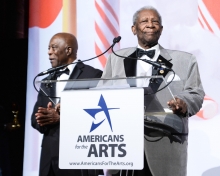'King of the Blues' Was 2013 National Arts Awards Recipient
Friday, May 15, 2015
Americans for the Arts mourns the loss of blues legend B.B. King (born Riley B. King), who passed away on May 14, 2015. With a career that spanned 70 years and more than 50 albums, King was the undisputed king of the blues. He toured the world well into his 80s, often performing 250 or more concerts a year. In 2013, King was honored at Americans for the Arts' National Arts Awards with the Isabella and Theodor Dalenson Lifetime Achievement Award, an award presented to a nationally recognized artist with a lifetime of exemplary artistic accomplishments in his or her field. Buddy Guy, fellow blues guitarist and singer and longtime friend, presented King with the award.
Born into a sharecropping family on September 16, 1925, in Itta Benna, Mississippi, King found inspiration in the music of the African American church. He dreamed of becoming a gospel singer and learned the rudiments of guitar from his preacher. King's first real public exposure came just after serving in World War II. He became a disc jockey in Memphis, Tennessee, where he was dubbed "the Beale Street Blues Boy." That nickname was shortened to "B.B." and the guitarist cut his first record in 1949. A year later, he cut "Three O'Clock Blues," his first #1 R&B hit.
King's early recordings found their way to Britain, with an audience for these recordings that included young performers like Mick Jagger, Eric Clapton, Jeff Beck, and George Harrison, and groups like the Bluesbreakers, Yardbirds, and Animals—all part of an emerging blues scene that was to combine with rock and become the dominant popular music of the time. King toured and recorded with British Invasion artists and established himself as a global entity as both a performer and recording artist. He was a mentor to scores of guitarists, including Clapton, Otis Rush, Buddy Guy, Jimi Hendrix, John Mayall, and Keith Richards.
King was inducted into the Blues Foundation Hall of Fame in 1984 and into the Rock and Roll Hall of Fame in 1987. He received a Grammy Award for Lifetime Achievement in 1987, and collected awards and honorary doctorates from the University of Mississippi, Yale University, and Berklee College of Music. In 1990, he received the National Medal of Arts, and in 2006 the highest civilian award in the United States, the Presidential Medal of Freedom. Over the course of his career, King went on to receive 18 Grammy Awards.






